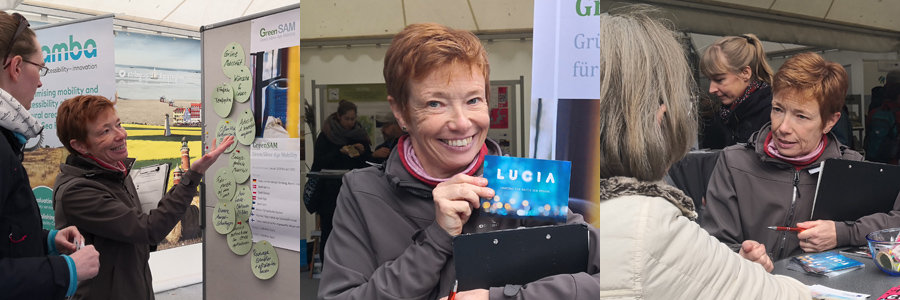Interreg Programmes aim to create change in their regions. That’s why cities and municipalities are important partners in Interreg Baltic Sea Region projects. However, there is scope for even more local public authorities to join Interreg partnerships. Heike Bunte from the borough of Hamburg-Altona shares her thoughts on city and municipality participation in Interreg Baltic Sea Region projects.

1. Why do you think Interreg is useful for local public authorities?
Well, public authorities need to provide for society. And society is developing and permanently changing. Interreg offers a colourful bouquet of experience and insight into what is happening in society in different cities and municipalities in different countries. This way, Interreg helps us to adjust our perspectives, and this is exactly what I wouldn’t get if I stayed at home in my own region. And all of this is provided to us by the European Union.
Interreg also allows us to try out new things much faster and more easily than is typically possible in our rather static administrative settings. Working in an EU-funded Interreg project can be a carte blanche to do something that would usually require months of discussion. And an Interreg project gives me a strong legitimacy – from the European Union – to test something new.
2. Shouldn’t municipalities and cities rather invest into Horizon 2020 projects which are longer and offer higher co-financing rates?
Well, that depends on the planned project or objective. In my view, Interreg is designed for authorities: Interreg focusses on practical implementation and asks for real-life pilots and demonstration investments. On top of this, Interreg provides a great framework for meeting researchers and practitioners on an equal footing.
I believe that H2020, on the contrary, has more of a science background. Practitioners like us can join, but authorities are not the focus of H2020 projects. I find Interreg much more open and flexible; this is why I think that Interreg is perfectly suited for local public authorities.
3. There are people who claim that Interreg is too bureaucratic – would you agree?
Interreg is to a certain extent bureaucratic, of course. But it is not more bureaucratic than a municipal administration itself. Instead, it provides a chance to do things on the ground. I think many city and municipal administrations do not participate in Interreg because they over-estimate the actual level of bureaucracy involved.
4. Which challenges do you and your colleagues from cities and municipalities face when trying to launch Interreg projects?
One challenge is a negative attitude towards the EU in general, which is stronger in some countries or municipalities than in others. However, it is all about knowledge building and investing into learning organisations. Currently, many people might still be afraid of working in English and of handling EU projects. With stronger knowledge building, I presume there would be more interest of municipalities to participate in Interreg.
For the same reasons, it can be a challenge to gain support for projects internally, in particular on the local political level. Not all decision makers believe that EU funding is useful. Some are even afraid that ‘Brussels’ will show up and dictate what we must do locally here in our own jurisdiction. These are challenges we face in many places in Germany as well as in municipalities in some other countries.
5. From your experience, which role do local public authorities play in Interreg projects?
It differs a lot. In some municipalities, there are concerns and barriers as I just described. Then there are other municipalities which are pioneering Interreg at full speed. They are happy with the opportunity and embrace the Interreg role entirely. They don’t question any more if Interreg is good or bad. Overall, their attitude is that Interreg is a great chance and they try to make as much out of it as possible. Riga and Tartu are such examples.
Among smaller municipalities, there are those for whom Interreg cooperation is a normal routine: they understand their tasks, they deliver results, they cooperate. And then there are those who are very unsure about whether they could actually achieve something and who are daunted by the EU. I would say we need to encourage them again and again to hammer home the message that Interreg cooperation can be quite straightforward.
6. What can the Managing Authority/Joint Secretariat do to help municipalities and cities to participate more in the future Programme to be launched after 2020?
Well, it’s not easy to give you a precise answer. What is needed most urgently is to convince the people working in public authorities that it is not overly difficult to handle project administration in Interreg.
Maybe the secretariat can highlight local authority partners who have been successfully implementing Interreg projects for some time. What did they have to do to get to where they are now? What did they need to adjust internally? How many resources did they need for this? How do they spend the funds and what exactly do they gain from the projects? Examples like these could be valuable in arguments during internal lobbying. It could be a good idea to create opportunities for people with experience as local public authority partners to talk to those not yet involved. Ideally, this would take place at events targeted exclusively to local public authorities in their own countries and in the local language. National contact points could play a central role in involving cities and municipalities if they are pro-active.
Heike Bunte is a research assistant at the borough of Hamburg-Altona. She has been working with Interreg projects in the fields of sustainable mobility. Currently, she leads the project LUCIA about smart lighting for cities. Interview by Stefanie Maack (Interreg Baltic Sea Region MA/JS).






